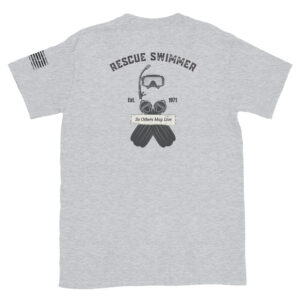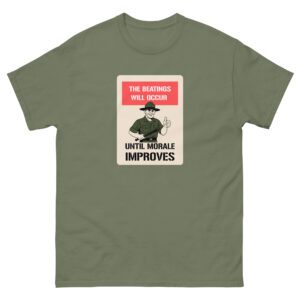Don't miss our flash to bang SALES!
Harrowing encounter with Hitler’s youth
Around the second day on the front lines, we came to an orchard where we found a number of British soldiers sitting around a stove drinking their tea. Standing there talking to them and being fresh on the lines, we started asking a number of questions. Having seen these puffs of smoke in the sky, I asked one of them ‘what are these dark puffs of smoke we keep seeing.’ One of them spoke up and said, ‘you blokes will learn soon enough.’
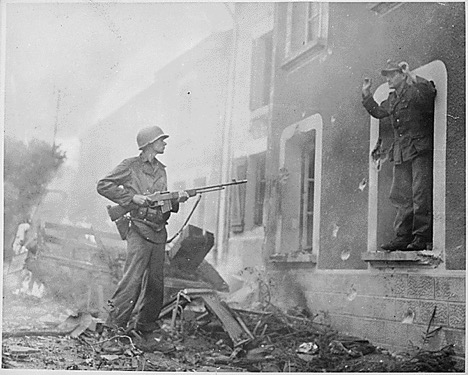 Days later, while sitting in another orchard having our chow, the Germans started shelling us with mortars. I ran to the weapons carrier and jumped under it for cover and as I lay there watching, I saw Moe running towards me when all at once a round hit right behind him. Shocked with what I just saw, I watched as my friend took his last two steps before falling forward on his face dead. There had been four of us who had been together since boot camp until now, and now one of the first ones to die in combat was Moe.
Days later, while sitting in another orchard having our chow, the Germans started shelling us with mortars. I ran to the weapons carrier and jumped under it for cover and as I lay there watching, I saw Moe running towards me when all at once a round hit right behind him. Shocked with what I just saw, I watched as my friend took his last two steps before falling forward on his face dead. There had been four of us who had been together since boot camp until now, and now one of the first ones to die in combat was Moe.
Moving inland you saw more and more gruesome sights, such as an American soldier I came across. He was lying on the side of the road and had been run over by a tank. His left arm was pointed skyward and on his hand I saw a ring. Here lay not only someone’s son but also a husband and maybe a father never to return home to his family. Another was the day I came across the soldier some dogs had been eating on.
As we made our way further inland, we not onlyencountered small groups of Germans as we moved through the villages, but also set up along the roads and fields. I had also found myself now walking the point more and more. I would also like to note that at this time I was the BAR man and being only 120 pounds, it was a job trying to keep the ammo belt pulled up all the time.
It was on one of those days while walking point I came face to face with three Hitler Youths as I went around the bend of this road. We had already faced some of these boys and found out that most of the time you had to kill them. For the most part, they wouldn’t give up or surrender, as would the older soldiers. At first we stood there staring at each other for what seemed to be forever. As we did, I thought, “why don’t they just drop their rifles and surrender?” when all at once one of them made a move that looked as if he was raising his rifle to take a shot at me. As he did, I swung my BAR up, firing and emptying my clip at the three of them. I hit the first boy in his neck and the next one I hit in his shoulder, but the third boy I cut in half. To this day, I can still see the top part of that boy’s body falling backwards to the ground as his legs stood there shaking for a moment before collapsing to the ground. Shocked with what I had done and weak kneed, I walked up to the boy and looked down at his face. I saw that he couldn’t have been more than 16. By now, the others had heard me fire and came running up and took charge of the two wounded boys.
That night as I sat in my foxhole alone, I removed a small paper bag from my pack. I had put some hard candy in it before leaving England and after tearing a piece from it, I wrote a letter home to my mother telling her what I had done.
In another letter, Robert wrote home:
“ I am still in France, thought I’d tell you I am in action on the front. We are fighting the Germans from hedgerow to hedgerow. All you can hear are the big guns and planes day in and day out. Dead cows, pigs and Germans litter the front. Pits of bricks and stones remain of what used to be a town. I am still getting the paper and it is good to read it over here. As we moved through the hedgerows, German losses added up as were ours. The Germans were good at hiding in the hedgerows.
One day I was told to take the point and check out the road ahead of us. As I made my way down the road and around the bend, there at the bottom of the slope a panzer sat sideways in a ditch covered with limbs and its turret facing up the road. Its crew was walking around the tank and hadn’t seen me at first when all at once the barrel raised and fired. I know the round went just over my head and exploded behind me. As for me, I had jumped into the hedge beside the road and was hugging the ground for all it was worth. I heard some of the guys in the field beside me yell out “TANK!” They
had a bazooka man with them and had made their way behind the tank knocking it out.”
Pvt. Paulson writes from overseas:
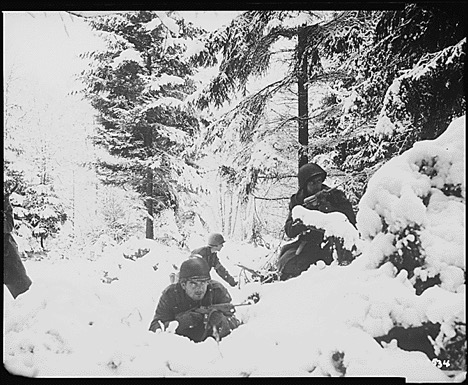 “I have moved since I last wrote your office. I am now somewhere in France. It has been a terrible war for the people of France. Their homes have been wiped from the earth. The Germans left nothing. The people like the Americans fine, and they in return are real nice. I am still getting your paper.”
“I have moved since I last wrote your office. I am now somewhere in France. It has been a terrible war for the people of France. Their homes have been wiped from the earth. The Germans left nothing. The people like the Americans fine, and they in return are real nice. I am still getting your paper.”
As we moved into the area of Metz, we ran out of gas and were short of ammo. One day as one of the artillery crews was covering one of their guns; a boy was standing in front of the barrel and he pulled the camouflage net up over the barrel. The net became hung on the lanyard and as he pulled, the gun went off blowing the boy in half.
Just before crossing over to Metz, an officer came by and seeing me with a German belt and luger he said, “You know what will happen to you if you’re captured with those things on you.” With that said, I sent them home to my dad.
Dec. 20, 1944 Somewhere in France
Dear Sir, It has been quite some time since I last wrote your
office. I am OK at this writing and still in France. I can also reveal that my outfit took part in the capture of the fortress city Metz. It was the first time in 200 years that Metz has ever been taken by storm, so we can be proud of our division and army. However, this is just one of many battles we won.
The Germans are still losing day by day. It is just like Lincoln said in the civil war, “We have won the war, though the hardest battles are still to be fought.” I am still getting the paper and before my subscription runs out please notify me
Yours truly Robert Paulson
During late fall of 1944 we had fought most of the day, pushing the Germans out of this small French village. That evening a unit came up and relieved us so we fell back about five miles to another village and as we arrived, we were told we had a few days of R and R. That evening I had a hot meal and was able to clean up. It was the first hot meal I had in a long time. Bo and I heard that a USO show was going to be put on that evening in a school that was in a town about 20 miles from us, so we asked permission to go. We found a German motorcycle with a sidecar that the Germans had left behind and after getting our hands on some gas, we made our way to see the show. Having driven a cycle in Iceland, I drove and Bo rode in the sidecar. Now Bo was a large man who reminded me of a caveman so he filled the sidecar.
About half way there we heard what sounded like rushing wind coming up behind us and a German fighter came over us as high as the treetops. As it did, I wondered why he didn’t shoot at us. The plane landed just ahead of us on the dirt road. As we came to a stop behind the plane, the pilot was jumping down from the wing with his hands over his head yelling, “Comrade, comrade you captured me.” Bo was still sitting in the sidecar with eyes the size of fried eggs and his mouth wide open. In broken English he asked where we were heading. We explained that we were going to see a USO show. With that, he said he was going with us and jumped on the front of the sidecar and off we went with our new friend. As Bo and I walked into the show with this German pilot no one said a word about it, and he sat between Bo and me clapping and yelling like everyone else. After the show was over and as we made our way to the door, two MP’s took him and as he was being lead off, he was telling the MPs we had captured him. When we returned to our unit that day word had come about the German and everyone was coming up and patting us on the back. We hid the motorcycle that evening thinking we would use it the next day, but that night some officer came by and said it was now the property of the U.S. Army and took it.
Just days before receiving orders that we were moving out, we heard the Germans had broken through the Ardennes. At the time of our movement north, all I had was my field jacket to wear and it was growing colder with every passing mile. The movement north was nonstop, other than stopping for gas. At night, the truck drivers drove all night with the lights on. We jumped off in a small village south of Bastogne and took up a position on top of a hill overlooking a valley. In the valley we could watch the Germans moving around, and each day they let us know they knew we were there with lots of shelling. It was during one of those shellings that Moon and I took cover in a pillbox that was on the side of the hill. Moon crouched down with his back to the outer wall and I had taken up a place on the bottom step. After the shelling stopped, the Lieutenant yelled down for us to come on so I said to Moon, “Let’s go.” Moon didn’t move so I walked over to him and placed my hand on his back, and as he fell forward I saw his back was covered with blood. I guess a piece of shrapnel had passed through a crack in the wall and hit him in his back just below his head.
Early Christmas morning, I was out with my squad of five guys on a forward post that overlooked a small field in the valley. As we sat there talking, we heard this “Comrade, comrade” coming from the field. I looked over the embankment to see these three Germans, one of which was waving a white flag as they made their way
towards us. I yelled out asking what they wanted, and in broken English one of them said they wanted to share some whiskey with us and wish us a Merry Christmas. The guy on the machine gun was told to stay there with the gun trained on them as we made our way down to them, and if one of them starts walking behind one of the others, shoot them as we fall to the ground. As we walked up they shook our hands and wished us a Merry Christmas. We stood there and talked for a short time and after we finished, they said they were returning to their lines and not to shoot them as they did.
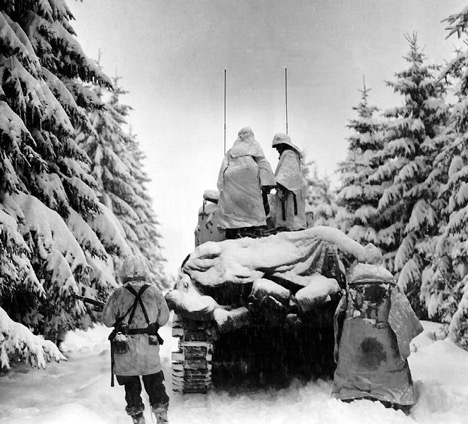 A day or so later we were still out on the same post watching the field. To the left of the field was a house that had a barn attached to it. As we watched, the doors of the barn opened and we could see the barrel of a tank appear. As it did, they shot a round that went right over our heads hitting the trees behind us.
A day or so later we were still out on the same post watching the field. To the left of the field was a house that had a barn attached to it. As we watched, the doors of the barn opened and we could see the barrel of a tank appear. As it did, they shot a round that went right over our heads hitting the trees behind us.
It was in this same hole one night, as I was watching the field, that I saw this wild hog running across the field right at me. I ducked back down and put my bayonet on my rifle and thought as he came past I would just bayonet him. As he came to my hole he jumped right over me and off into the woods.
There were a lot of times during those shellings that you were caught out in the open, so you ran to the nearest hole to jump into, only to find the body of a frozen soldier in it with you. The day we pulled out of that area, I remember sitting in the back of the jeep
thinking to myself that we’re leaving some good buddies in those holes.
My squad and I had taken a break in this house one day and as we sat there in the front room, I heard this terrible sound coming. Just as I thought “Oh boy,” and before we could move, an explosion rocked the house causing the front wall to come in on us. The next thing I knew, or could remember, was being put in the back of a truck. When I came to, I woke up in a hospital and asked where I was. I was told I was in the hospital in Luxemburg and had a bad concussion. I said, “Luxemburg” and asked where the guys were who had been with me. I was told they didn’t know about the others and that I had been out for two weeks.
When I was released from the hospital, I was found unfit to return to combat duty and was sent to Sheaf Headquarters to work in the motor pool where I lived at the Rue de Tippin. The day I reported for duty at the motor pool, I was to report to some colonel whose office was on the third floor. I was advised that my new duty was to assign drivers and dispatch limousines as the calls came in for one.
One day a call came in requesting a limousine, and I advised the officer that I didn’t have a driver at the time and that I was the only one in the office at that time. The officer said, “Sergeant do you have a car?” and I replied that I did. He then asked if I knew how to drive and I said I did and with that he asked me if I had
the keys to lock the door. As I answered, “Yes sir,” he said get going. So with that I was then given the address of the hotel and room number. At the hotel I went upstairs and found the room and knocked on the door. The door opened and there stood George Brooks the dancer and inside sat Jane Forman. I helped get her into her wheelchair and down to the car. There were a lot of troops in Paris in camps named after different cigarettes. One camp was named Old Gold and another after Chesterfield, and I was to drive them to these different camps that day. After we had finished that day, I returned them back to their hotel where I was asked to join them for coffee and to talk. After that, every time she needed a driver, they requested that I would be the
one. On May the sixth of 1945 a call came in and someone requested to speak to me. On the other end was some colonel who advised me that I was being assigned as the driver to pick up someone at the airport in Reims on May the seventh, after I had stopped by the Little Red school house. He went on and said, “Sergeant make damn sure you are wearing your best uniform with all your metals.” Then I was told I was also to use the Rolls Royce Ike used while in Paris.
The following morning I arrived at the office early and waited until someone showed up before leaving for Reims. As I pulled in front of the schoolhouse, I saw two jeeps of MPs and no sooner had I come to a stop,
than a young Lieutenant jumped into the front seat with me. Before I could say a word, the Lieutenant said, “Sergeant, follow the jeeps.” The whole time in the car he never said a word. He just sat there.
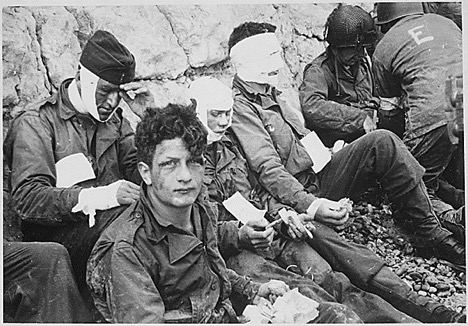 I followed the jeeps to the airport and as we arrived there were a number of other jeeps and MPs standing around. I was told to park my car alongside the runway, which I did. After parking, I decided I wasn’t going to just sit there with the Lieutenant and got out to smoke my pipe. As I stood at the side of the car, a Lieutenant came up and said he was in charge of the MPs. He then went on to tell me that I was there to pick up a high ranking German officer and that as he walked up to the car, I was to salute him as he walked up. Standing there listening to him, I thought to myself that just months ago I was shooting them and now I’m to salute one.
I followed the jeeps to the airport and as we arrived there were a number of other jeeps and MPs standing around. I was told to park my car alongside the runway, which I did. After parking, I decided I wasn’t going to just sit there with the Lieutenant and got out to smoke my pipe. As I stood at the side of the car, a Lieutenant came up and said he was in charge of the MPs. He then went on to tell me that I was there to pick up a high ranking German officer and that as he walked up to the car, I was to salute him as he walked up. Standing there listening to him, I thought to myself that just months ago I was shooting them and now I’m to salute one.
It wasn’t long before I saw this C47 coming and after it landed, the plane came to a stop near my car. The ground crew rolled a ladder to the door and as it opened, out stepped this officer dressed in a long black leather coat. As he stepped to the ground two MPs walked him over to the car where I stood. As I saluted him he was introduced to me as Colonel Jodl. He returned my salute and as he did, he pointed to metals on my chest and said something about being a brave soldier. I opened the door of the car and he stepped in. After I got back in, the Lieutenant once again just said, “Sergeant, follow the jeeps.”
As we made our way back to town Jodl asked me how I liked Germany. I said it was properly nice before we bombed it. He said something about if it hadn’t been for Hitler it would have been different. As I neared the schoolhouse I could see a crowd standing in front of the building. The MPs pushed them back and as I opened his door to let him out, a number of reporters took his picture. As I closed his door, once again Jodl saluted and said, “Well Sergeant, you are the last decent person I will be seeing after today.” With that, he was escorted on inside and no sooner had he entered the building, than a number of reporters asked me questions.
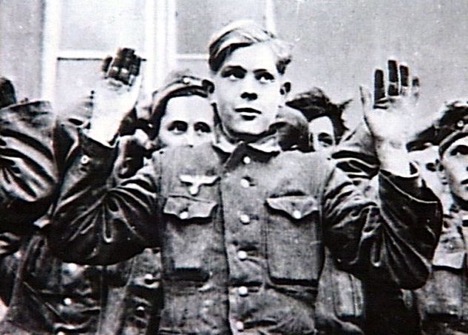 I had a little time to kill before heading back to Paris to meet up with my brother whom I hadn’t seen since 1941 in Iceland, and while I was waiting around, a reporter came out of the schoolhouse saying the war was over.
I had a little time to kill before heading back to Paris to meet up with my brother whom I hadn’t seen since 1941 in Iceland, and while I was waiting around, a reporter came out of the schoolhouse saying the war was over.
(This World War II veteran war story is courtesy of Witness to War Foundation)
(Pictures courtesy of the National Archives)
To learn more about WW2 history check out the following:
#affiliates#thefrontlines
Popular Products
-

Swim Against the Current
Price range: $19.50 through $28.00 Select options This product has multiple variants. The options may be chosen on the product page -

Rescue Swimmer Est. 1971
Price range: $27.00 through $33.00 Select options This product has multiple variants. The options may be chosen on the product page -

Will Fly For Food
Price range: $19.50 through $28.00 Select options This product has multiple variants. The options may be chosen on the product page -

The Beatings Will Occur
Price range: $18.95 through $24.95 Select options This product has multiple variants. The options may be chosen on the product page


